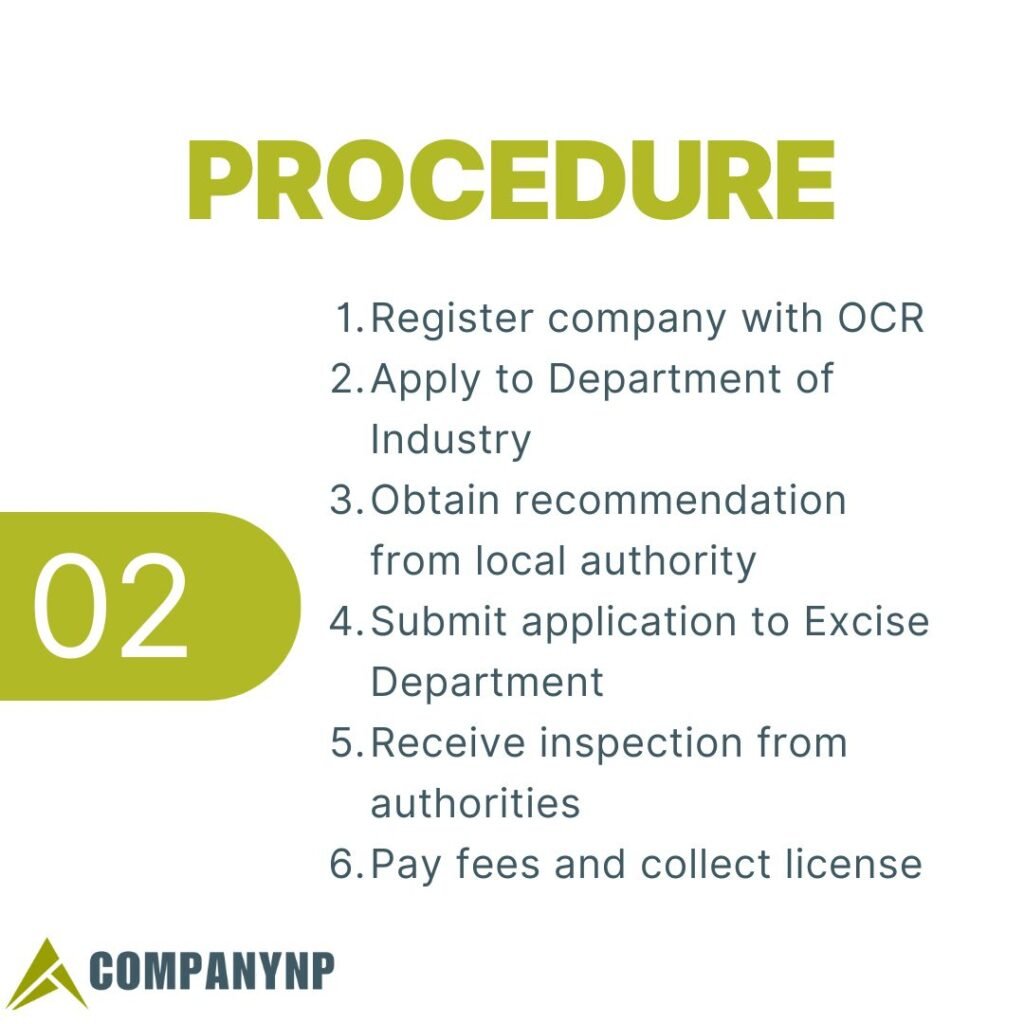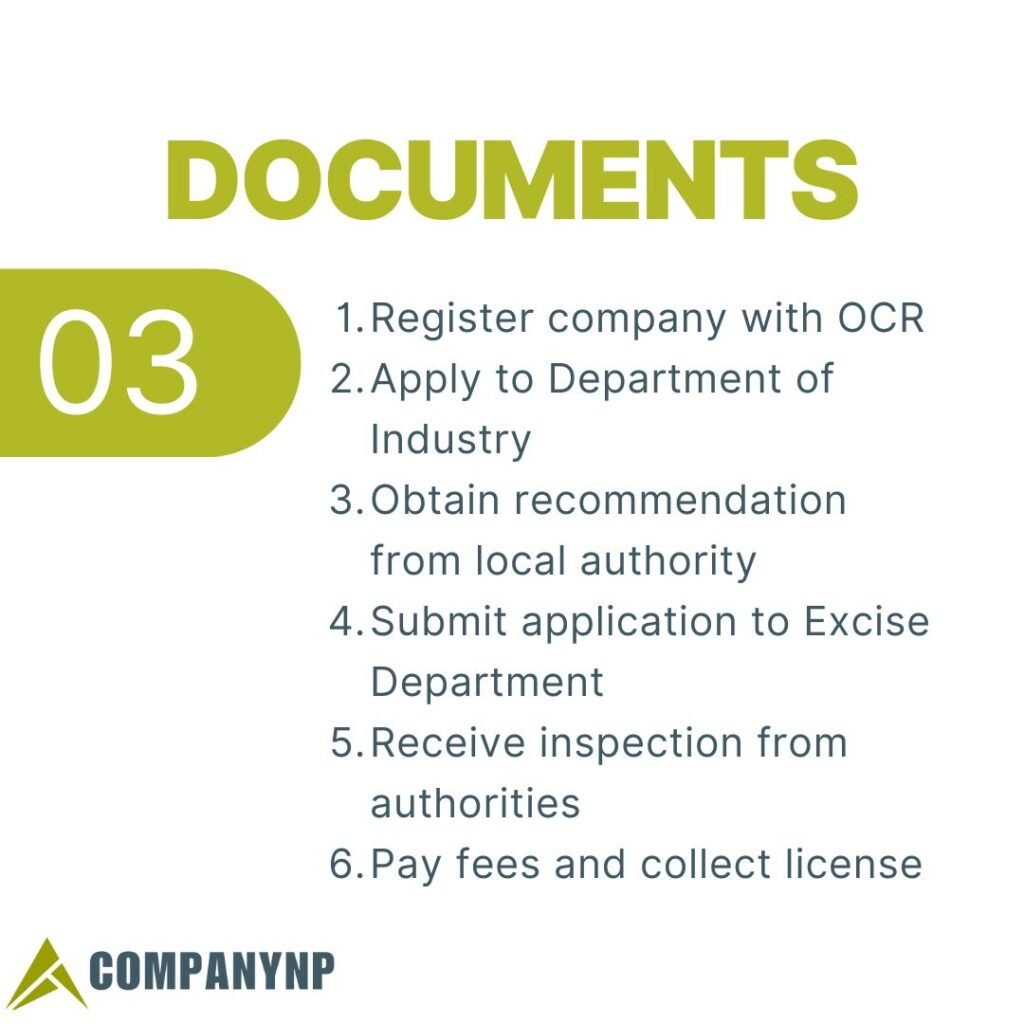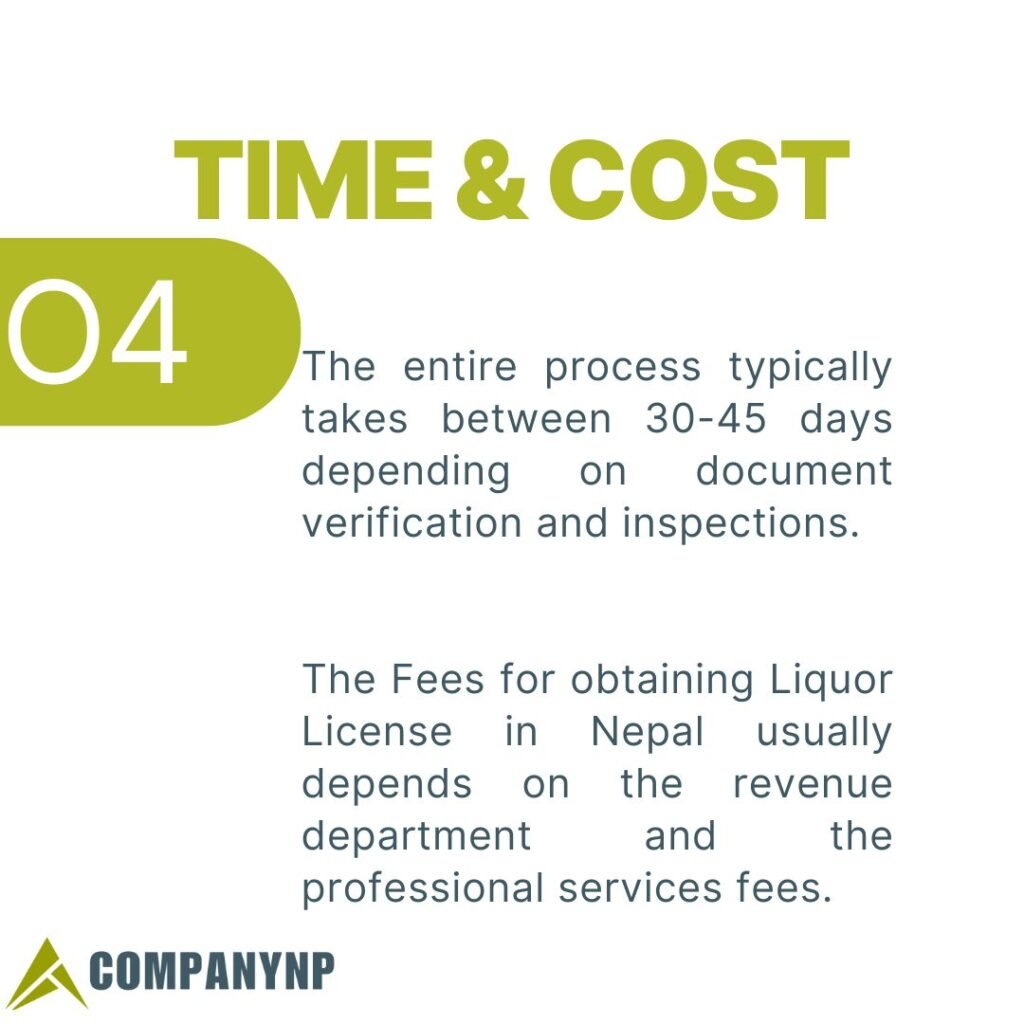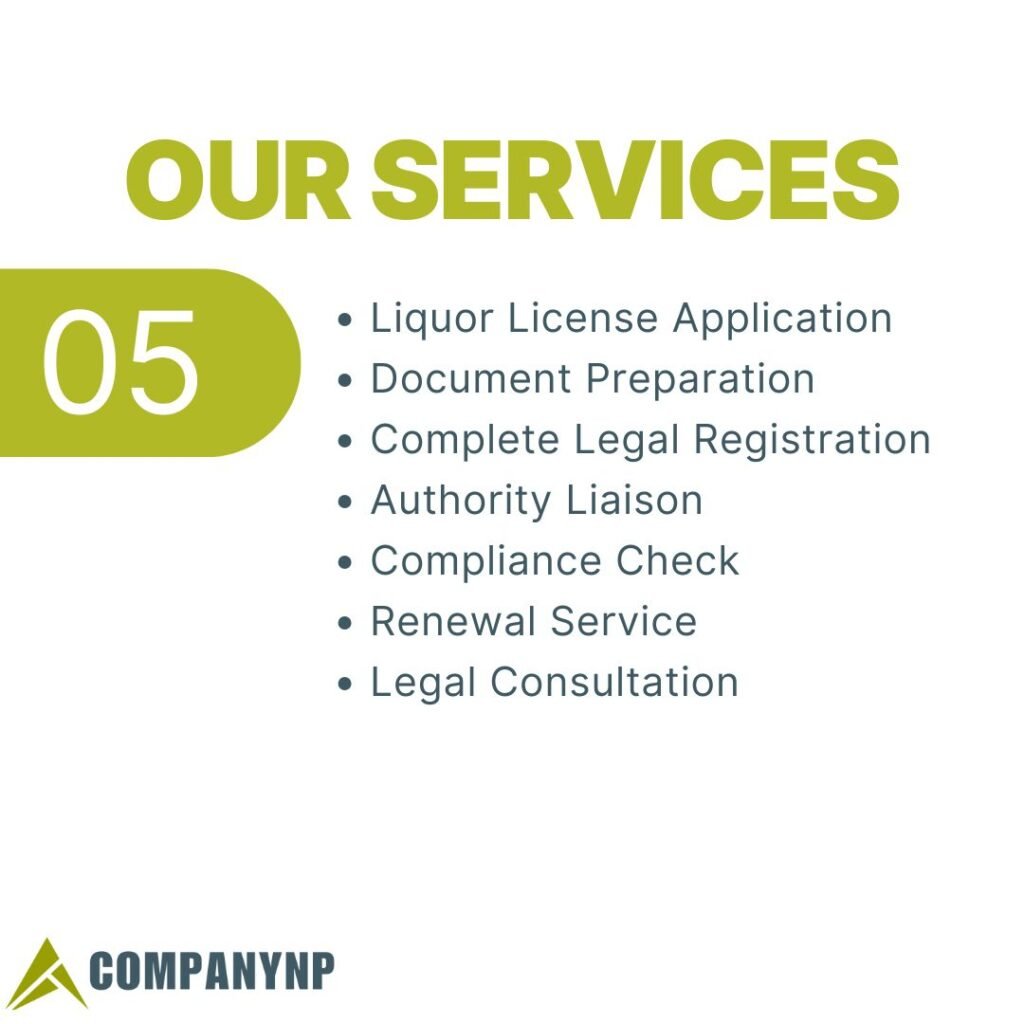Understanding Liquor Licenses in Nepal
A liquor license in Nepal is an official permit issued by the government that allows businesses to sell, distribute, or manufacture alcoholic beverages. There are two types of Liquor License in Nepal: Liquor License to Sell & Distribute, License to Manufacture Liquor. We shall cover the process of obtaining license for selling and distributing liquor.
This license is crucial for any establishment that wants to legally handle alcohol, including restaurants, bars, hotels, and retail stores. The license ensures that businesses comply with Nepal’s liquor laws and regulations, which are designed to maintain public safety and control alcohol consumption. Obtaining a liquor license is a mandatory step for entrepreneurs looking to enter the alcohol industry in Nepal, as it provides legal protection and legitimacy to their operations.
The Issuing Authority for Liquor Licenses
In Nepal, the Department of Revenue Investigation (DRI) under the Ministry of Finance is the primary authority responsible for issuing liquor licenses. The DRI works in coordination with local administrative offices to manage the licensing process. Depending on the type of license and the location of the business, applicants may need to interact with:
- District Administration Offices
- Municipality offices
- Ward offices
- Inland Revenue Department
These authorities work together to ensure that all liquor-related businesses operate within the legal framework and adhere to national and local regulations.
Process of Liquor License in Nepal
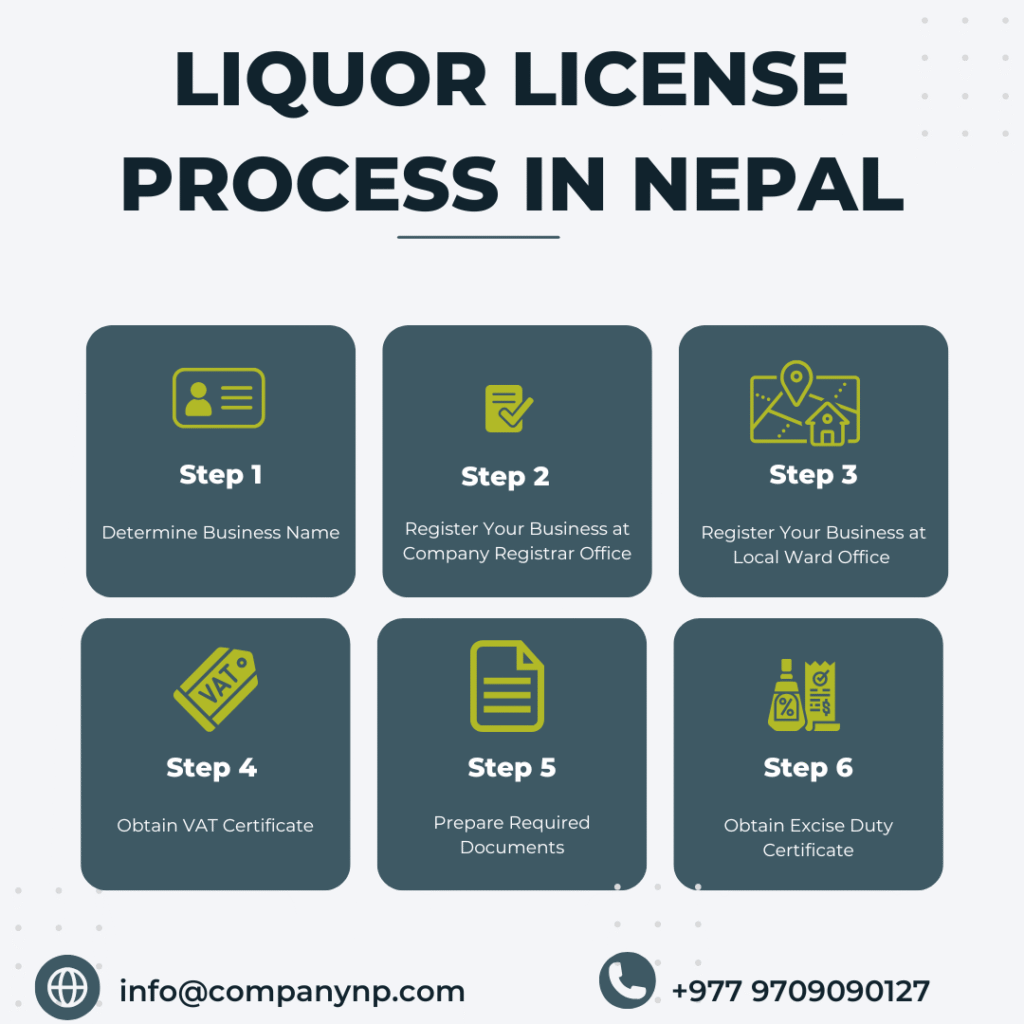
Step 1: Determine Business Name
Step 2: Register Your Business at Company Registrar Office or
Step 3: Register Your Business at Local Ward Office
Step 4: Obtain VAT Certificate
Step 5: Obtain Excise Duty Certificate (Yearly Renew)
Step 1: Determine Business Name
Choose a unique and appropriate name for your business along with the following details:
- Name
- Location
- Authorized Capital
- Nature of Business
Step 2: Register Your Business at Company Registrar Office or
Visit the Company Registrar Office to officially register your business. To register your company, the following documents are required: Application Form, Articles of Association, Memorandum of Association, and more.
Step 3: Register Your Business at Local Ward Office
If not registering at the Company Registrar Office, proceed to your Local Ward Office. Bring identification, proof of residency, and business details. Complete the registration form and pay applicable fees.
Step 4: Obtain VAT Certificate
pply for a Value Added Tax (VAT) certificate from the relevant tax authority. Prepare financial statements, business registration documents, and tax identification information. Submit the application and wait for processing.
Step 5: Obtain Excise Duty Certificate (Yearly Renew)
Apply for an Excise Duty Certificate from the appropriate government department. Provide business details, liquor inventory information, and payment of required fees. This certificate must be renewed annually. It authorizes your business to manufacture, store, and sell alcohol products in compliance with local excise laws.
Documents Required for Liquor License in Nepal
The Following documents are necessary for obtaining liquor license approval in Nepal:
- Completed application form
- Proof of business registration (PAN/VAT certificate)
- Tax clearance certificate
- Citizenship certificate of the business owner
- Rental agreement or property ownership documents
- Local authority’s recommendation letter
- Ward Registration Certificate
Additional documents may be required depending on the type of license and specific local regulations. It’s advisable to check with the licensing authority for a complete list of required documents before submitting your application.
Timeline for the Liquor Licensing Process
The duration of the liquor licensing process in Nepal can vary depending on several factors:
- Type of license applied for
- Completeness of the application
- Workload of the licensing authority
- Complexity of the business setup
The liquor licensing process takes 5-10 Days in Nepal from initial registration to obtaining the Excise Duty Certificate.
Costs Associated with Obtaining a Liquor License
The costs of obtaining a liquor license in Nepal can be broken down into several categories:
- Application fee: A non-refundable fee paid when submitting the application.
- License fee: Varies based on the type of license and business location.
- Renewal fee: Annual fee to maintain the license.
- Inspection fees: Charges for premises inspection by authorities.
- Legal and consulting fees: If professional assistance is sought.
- Document preparation costs: Expenses for obtaining and certifying required documents.
The exact costs can vary significantly depending on the scale and nature of the business. For example:
- Small retail shop: NPR 50,000 – 100,000
- Mid-sized restaurant: NPR 100,000 – 200,000
- Large hotel or distributor: NPR 200,000 – 500,000
It’s important to budget for these costs and consider them as part of your overall business startup expenses.
Legal Framework Governing Liquor Licensing
The liquor licensing process in Nepal is governed by several laws and regulations:
- Liquor Act, 2031 (1974)
- Liquor Rules, 2033 (1976)
- Local Government Operation Act, 2074 (2017)
- Revenue Leakage (Investigation and Control) Act, 2052 (1995)
These laws outline the requirements for obtaining and maintaining a liquor license, as well as the penalties for non-compliance. They cover aspects such as:
- License application procedures
- Eligibility criteria for license holders
- Operating hours for liquor establishments
- Restrictions on alcohol sales to minors
- Quality control measures for liquor products
- Taxation and revenue collection
Understanding these laws is essential for any business owner looking to enter the liquor industry in Nepal.
Post-License Requirements for Liquor Businesses
After obtaining a liquor license, businesses must adhere to several ongoing requirements:
- Annual renewal: Licenses must be renewed yearly, typically involving a fee and compliance check.
- Record keeping: Maintain detailed records of alcohol purchases, sales, and inventory.
- Age verification: Implement strict procedures to prevent sales to minors.
- Operating hours: Adhere to legally mandated operating hours for alcohol sales.
- Quality control: Ensure all alcohol products meet quality and safety standards.
- Staff training: Provide regular training on responsible alcohol service and legal compliance.
- Tax compliance: Regularly file and pay all required taxes related to alcohol sales.
Failure to meet these requirements can result in fines, license suspension, or revocation. Regular self-audits and staff training can help ensure ongoing compliance.
Types of Liquor Licenses Available in Nepal
Nepal offers several types of liquor licenses to cater to different business models:
- Retail License: For shops selling packaged alcohol for off-premises consumption.
- On-Premises License: For restaurants, bars, and hotels serving alcohol for immediate consumption.
- Wholesale License: For businesses distributing alcohol to retailers.
- Brewery License: For manufacturing beer and other fermented beverages.
- Distillery License: For producing spirits and other distilled alcoholic beverages.
- Import License: For businesses bringing foreign alcohol products into Nepal.
- Special Event License: Temporary permits for serving alcohol at events or festivals.
Each license type has specific requirements and restrictions. Businesses should carefully consider their operational needs when choosing the appropriate license.
Read More:
Bank Account Opening Process for Companies in Nepal
Company Renewal Process in Nepal
Company Closure or Liquidation Process in Nepal
Benefits of Having a Liquor License
Obtaining a liquor license in Nepal offers several advantages:
- Legal compliance: Operate your business within the law, avoiding potential fines or closure.
- Expanded revenue: Tap into the profitable alcohol market, potentially increasing your overall income.
- Competitive edge: Stand out from non-licensed competitors in the hospitality industry.
- Customer satisfaction: Meet customer demand for alcoholic beverages, enhancing their experience.
- Business growth: Use your license as a foundation to expand your business offerings.
- Quality assurance: Access regulated alcohol supply chains, ensuring product quality and safety.
- Networking opportunities: Join industry associations and collaborate with other licensed businesses.
A liquor license can be a valuable asset for businesses in Nepal, opening up new opportunities and ensuring long-term sustainability in the competitive food and beverage sector.
Frequently Asked Questions
How to get Liquor License in Nepal?
Liquor License Process in Nepal
Step 1: Register Your Business in OCR
Step 2: Register your Business in Local Ward
Step 3: Obtain Value Added Tax (VAT) Certificate
Step 4: Obtain Excise Duty Certificate
What is the process of Alcohol Service License?
Process of Alcohol Service License
Step 1: Consult with BizNepal
Step 2: Registration of Business
Step 3: Obtain Local Ward and VAT Certificate
Step 4: Completion of Excise Duty (अन्तः शुल्क)
Step 5: Renewal of Excise Duty (Yearly)
What is the Cost of Liquor License?
The Cost of obtaining Liquor License in Nepal depends on your Location. If it is inside Kathmandu Valley, the cost is higher. If the License is required outside Kathmandu Valley, the cost is lower.
Consult an Expert
Refer the Following:
New Liquor Manufacturing License
Contents
- 1 Understanding Liquor Licenses in Nepal
- 2 The Issuing Authority for Liquor Licenses
- 3 Process of Liquor License in Nepal
- 4 Documents Required for Liquor License in Nepal
- 5 Timeline for the Liquor Licensing Process
- 6 Costs Associated with Obtaining a Liquor License
- 7 Legal Framework Governing Liquor Licensing
- 8 Post-License Requirements for Liquor Businesses
- 9 Types of Liquor Licenses Available in Nepal
- 10 Benefits of Having a Liquor License



